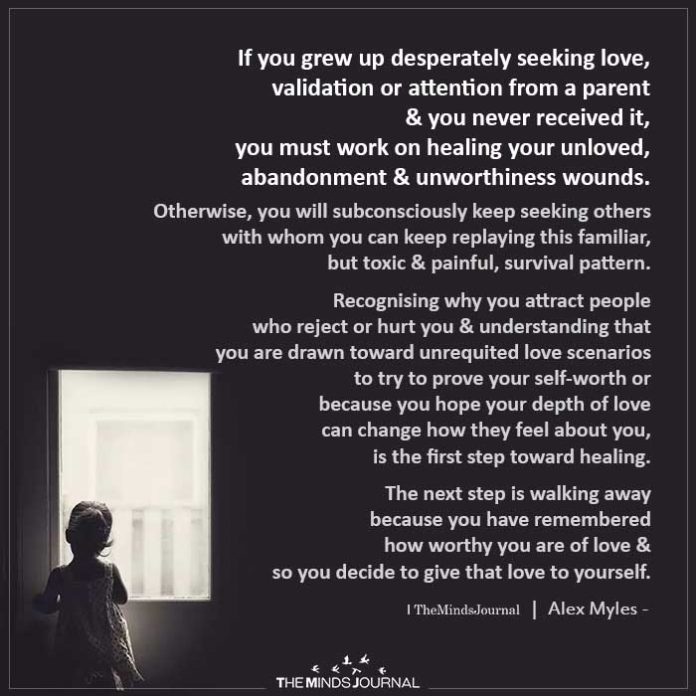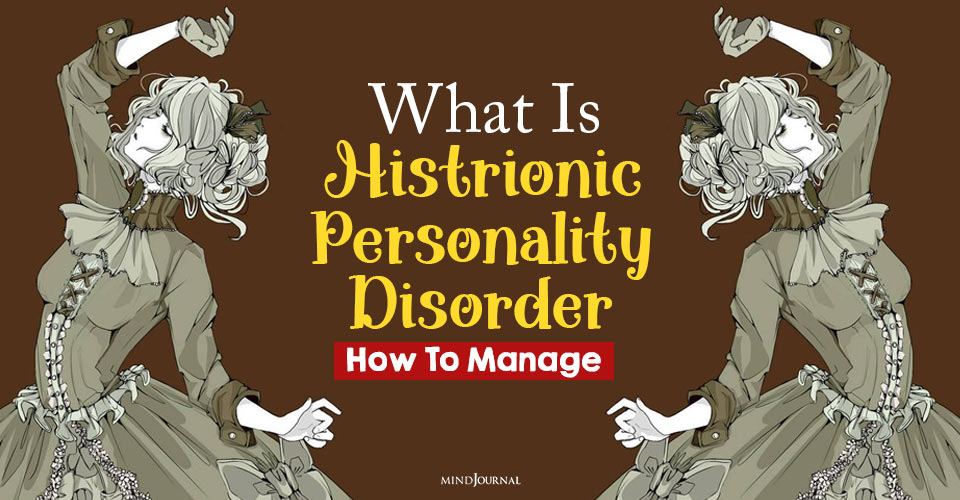Do you seek attention all the time? Do you use your physical appearance to gain attention and appreciation from others? Then you may have a histrionic personality disorder (HPD). It is a mental condition that leads to attention-seeking behavior and disrupts your daily life.
What is histrionic personality disorder?
Originally identified as a hysterical personality disorder, HPD is a psychiatric disorder that is characterized by excessive attention-seeking responses and intense emotionality. People with histrionic personality disorder have a poor sense of self-worth, low self-esteem and they have a strong need for gaining approval and validation from others.
So if you tend to behave inappropriately and dramatically most of the time and feel an overwhelming need to get noticed, then it is likely that you are a histrionic person.
According to the American Psychiatric Association, a histrionic personality disorder is “a pattern of excessive emotion and attention-seeking.” The condition is categorized as a Cluster B personality disorder, which includes borderline personality disorder, narcissistic personality disorder, antisocial personality disorder, and histrionic personality disorder.
This group of personalities is usually overly emotional, dramatic, and engages in unpredictable behavior. If you belong to this personality, then you may likely consider everything in an extremely emotional way. This may lead to inappropriate or unacceptable behavior at times, especially when you are in a social or professional setting.
In fact, you may feel upset, unappreciated, and uncomfortable when you are not the center of attention in your current environment.
Read also: Histrionic Personality Disorder: How This Type Of Narcissism Works In Women
The disorder can develop during early childhood or even during adulthood. It has been observed that HPD affects approximately 2-3% of the population. Although men and women are affected equally, some studies show that more women are affected than men.
How HPD affects you
The American Psychological Association (APA), defines HPD as “a personality disorder characterized by a pattern of long-term (rather than episodic) self-dramatization in which individuals draw attention to themselves, crave activity and excitement, overreact to minor events, experience angry outbursts, and are prone to manipulative suicide threats and gestures.” Histrionic individuals tend to be highly enthusiastic, cheerful, flirtatious, and seductive.
However, they may behave in an inappropriately sexual manner to seek approval and attention. Some other common traits of histrionic people include:
- Highly theatrical
- Volatile
- Inconsiderate
- Excitable
- Demanding
- Egocentric
- Dependent
- Shallow
- Erratic
- Self-indulgent
- Sexually provocative
They also engage in risky behavior as they constantly seek stimulation. As a lack of attention leads to discomfort, these personalities can often be manipulative, narcissistic, and use their sexuality to draw attention.
Although histrionic people tend to be the life of the party, their self-image is likely to be distorted. They are usually loud and vibrant yet have inconsistent and superficial emotions.
As a result, they are mostly regarded as insincere individuals in their social groups. They may even “embarrass friends and acquaintances with excessive public displays of emotion, such as embracing casual acquaintances with passion, sobbing uncontrollably over minor setbacks, or having temper tantrums,” explains Psychology Today. However, people with HPD can be impressionable and suggestible and so they can be easily influenced by others.
Read also: Psychology Behind Attention Seeking Behavior in Adults

Histrionic personality and other disorders
If you are a histrionic person, then you are at higher risk of developing narcissistic personality disorder and major depressive disorder. Studies reveal that the condition can also lead to antisocial personality disorder in males and somatization disorder in females. This condition can co-exist with some other comorbid disorders such as:
- Borderline personality disorder
- Dependent personality disorder
- Attachment disorders
- Post traumatic stress disorder (PTSD)
- Anxiety disorders
- Conversion disorders
- Panic disorder
- Body dysmorphic disorder
- Eating disorders
- Substance abuse
Read also: How To Stop People-Pleasing and Still Be Nice: 5 Rules To Live By
What are the symptoms of HPD?
Individuals with HPD are usually attention-seeking and overly dramatic. Some of the most common symptoms of the psychiatric disorder include:
- Constant attention-seeking behavior
- Persistent dramatic behavior
- Inappropriately flirtatious or seductive behavior
- Rapidly shifting and inconsistent emotions & mood swings
- Feeling uncomfortable when not the center of attention
- Extremely concerned about physical appearance
- Seeking reassurance or approval constantly
- Suggestible and easily influenced by others
- Hyper-sensitive to disapproval, negative feedback or criticism
- Speech is vague and lacks detail
- Engaging in risky behavior to seek new adventures and experiences
- Lacking empathy and highly self-centered
- Believing relationships are closer than they actually are
- Suicidal tendencies due to lack of attention
Research also shows that histrionic people can also develop alexithymia which makes it harder for them to recognize or express their feelings. These symptoms of histrionic personality disorder may start appearing during childhood or even early adulthood.
What causes histrionic personality disorder?

Researchers are yet to identify the precise cause for the onset of HPD. However, certain factors like genetics, upbringing, environment, and brain structure, may greatly influence the onset of this personality disorder.
Moreover, intense stress and anxiety during childhood or adolescence may also lead to its development. Let us take a look at some of the causes and risk factors that may contribute to the development of this mental condition in someone:
1. Genetic factors
Histrionic personality disorder tends to run in families. Research indicates that there may be a genetic predisposition for cluster B personality disorders. If you have a first-degree family member with HPD or a personality disorder, then it is likely that you may be affected by the disorder as well. Twin studies also show that there is a strong relationship between genetics and Cluster B personality disorders.
2. Upbringing
Parenting style can also be a determining factor in the onset of HPD. According to a recent study, “Parenting which lacks boundaries is over-indulgent or inconsistent may predispose children to develop a histrionic personality disorder.”
Inconsistent or neglectful parenting can result in non-existent or poor boundaries that can affect a child’s emotional and psychological development.
Apart from this, a child can also learn such behavior from parents who display volatile, dramatic, and oversexualized behavior. Children may also resort to such inappropriate behavior to draw attention from primary caregivers. Moreover, if a child receives positive reinforcement or rewards for overdramatic behavior then they may also develop histrionic tendencies.
Read also: 19 Signs You Were Raised By a Narcissistic Mother or Father

3. Childhood abuse or trauma
Trauma, abuse, or neglect experienced during childhood is another crucial factor that may influence its development. Emotional, physical, and sexual abuse can often increase the likelihood of histrionic personality. The APA explains that research has indicated a significant “link between the number and type of childhood traumas and the development of personality disorders.”
Children who experience trauma may develop certain personality disorders as a coping mechanism. Family dynamics and excessive household stress can also add to the risks.
Read also: 8 Adult Traits That Manifest Due To Childhood Emotional Abuse
4. Brain anatomy
Brain functioning and structure can also be an influencing factors as well. Our brain creates chemicals that affect our thoughts, emotions, attitudes, behavior, and personality. When certain brain chemicals become dysfunctional or out of balance, a person may develop a histrionic personality.
Research shows that the overly emotional and dramatic behavior of HPD individuals can be due to a disbalance in catecholamines, a type of neurotransmitter. Studies have also found that these personalities possess “highly responsive noradrenergic systems, the mechanisms surrounding the release of a neurotransmitter called norepinephrine.”
5. Other factors
Some researchers believe that biopsychosocial factors can also influence the onset of histrionic personality disorder. Psychological factors relate to a child’s environment when they are growing up and the skills they learn; while social factors refer to how we interact with others during our childhood.
Apart from these, the age of a person can also influence the intensity of HPD symptoms. A young person may act more flirtatious and use their physical appearance to draw attention; whereas an older person may use intellect maternal/paternal seductiveness for the same purpose.
How HPD diagnosed
Histrionic people may have a poor social reputation due to their oversexualized behavior. Moreover, it can also affect their intimate relationships and may even affect their daily functioning, based on the intensity of the symptoms.
However, early diagnosis and treatment can help a histrionic person to live a more fulfilling and satisfying life. But as HPD can co-occur with other mental disorders, diagnosis can be a challenging and complex process.
The American Psychiatric Association’s DSM-5 has laid down the following diagnostic criteria for Histrionic Personality Disorder and a patient must meet at least 5 of these:
- Discomfort in situations when you are not the center of attention
- Interacting with others in an inappropriate sexually seductive or provocative behavior
- Shallow and unstable expression of emotion
- Using your physical appearance to attract attention repeatedly
- Speech is extremely impressionistic and lacks detail
- Displaying self-dramatization and heightened expression of emotion
- Easily swayed and influenced by other people or situations
- Believes relationships to be more intimate than they actually are
Healthdirect Australia reveals that histrionic personality disorder can be diagnosed only in adults and not in children “and should be made only by a psychiatrist or clinical psychologist who gets to know the person over a period of time.”
Diagnosis cannot be made by using any specific lab tests. However, a doctor may conduct some tests to rule out if the symptoms are caused by other medical conditions, medications, or substance abuse.
Read also: 3 Sneaky Techniques Narcissists Use to Gain Attention
Can histrionic personality disorder be treated?
Yes, with effective treatment, a histrionic person can relieve the symptoms. The Merck Manuals explain “General treatment of histrionic personality disorder is the same as that for all personality disorders.” People with HPD can be successfully treated with long-term psychotherapy and medication.
Unfortunately, most patients do not seek any treatment as they don’t think they have a mental condition. If you believe you have a histrionic personality disorder, then make sure that you seek medical treatment immediately by visiting a mental health professional. Here are a few effective treatment options available for individuals with HPD:
1. Psychotherapy
Most doctors recommend psychotherapy for the treatment of this condition. A therapist can help you to gain insight into the disorder and understand your emotions, thoughts & behaviors. Author Kendra Cherry, MS, explains that therapy can significantly help in “improving self-esteem, reducing emotional distress, and improving coping skills.”
It can also enable you to connect with others in a healthier and more positive way. Cognitive-behavioral therapy (CBT) is one of the most helpful and popular forms of psychotherapy that can help you become more conscious of your unhealthy thought patterns and impulsive behavior.
Studies show that CBT is an effective treatment option “for reducing symptoms and enhancing functional outcomes among patients with PDs (personality disorders), thereby making it a useful framework for clinicians working with patients with PD symptomatology.”
Read also: 11 Signs You Need To Talk To A Therapist
Cognitive analytic therapy (CAT) is another effective form of therapy that can specifically help people with HPD. It helps to alter how you think, feel, behave, and react to stimuli. According to a 2007 study, CAT can not only help with HPD, but it can also reduce depression and anxiety.
Functional analytic psychotherapy (FAP) is also widely recommended as it allows the therapist to directly observe and understand the behavior patterns of the patient as it occurs in session. One 2003 study states that FAP has “produced significant changes in these behaviors both statistically and qualitatively.”
Other therapy techniques for the treatment of histrionic personality disorder may include:
- Supportive psychotherapy
- Psychodynamic psychotherapy
- Family and couples therapy
- Group therapy
- Psychoeducation

2. Medications
As of now, no specific medication has been approved by the United States Food and Drug Administration (FDA) for the treatment of HPD. However, doctors may prescribe certain medications for relieving certain symptoms and associated conditions like mood swings, anxiety, and depression. If you are a histrionic person, then your doctor may prescribe the following medications:
- Mood stabilizers (lithium, lamotrigine, topiramate, carbamazepine, and valproate)
- Antipsychotics (olanzapine, risperidone, haloperidol, and aripiprazole)
- Antidepressants (desipramine, fluvoxamine, fluoxetine, and amitriptyline)
- Anti-anxiety medication
Doctors may also recommend inpatient and even intensive outpatient treatment programs in case of severe symptoms or emergencies.
How you can cope with histrionic personality disorder
Apart from medications and therapy, there are certain self-help strategies that you can implement to cope with histrionic tendencies, such as:
1. Learn about HPD
Educate yourself and gain valuable knowledge about your personality disorder. This can empower you and motivate you to seek treatment.
2. Gain coping skills
Learn helpful relaxation techniques and stress management skills to overcome certain symptoms. Holistic practices, like yoga, meditation, deep breathing, and Tai Chi can help you manage your emotional reflexes, anxiety, and depression.
According to a 2009 study, “In addition to evidence-based medical uses, meditation may have psychiatric benefits.” Research shows that mindfulness meditation positively impacts our personality and personality profiles.
Read also: The Connection Between Mindfulness And Recovery Success
3. Take care of your health
Staying physically healthy can significantly help you in overcoming mental health problems. So make sure to be physically active and follow a healthy, nutritious diet. Exercise regularly and avoid processed food and sugar to better regulate your mood and emotions. You should also make sure to get enough undisturbed sleep on a daily basis.
4. Avoid stimulants
Limiting your daily consumption of coffee and cigarettes can be challenging but avoiding or restricting caffeine and nicotine consumption can help greatly.
5. Avoid alcohol and hard drugs
Alcohol and substance use can often worsen symptoms of personality disorders, according to the American Psychiatric Association. Quitting alcohol, drugs, and other harmful substances can substantially improve your mood and help with emotional regulation.
Read also: A Kind Guide To Coping Skills For Substance Abuse When Depressed
6. Stick to the treatment plan
Make sure to regularly consult your doctor and follow your medical care routine. Do not avoid attending your therapy sessions and properly take all medicines as prescribed by your doctor.
7. Connect with your family and friends
Seek emotional and mental support from your loved ones and strengthen your relationships without seeking attention. Focus on developing emotional connections and learn to build compassion and empathy. Avoid social isolation as it may lead to major depression.
If you feel suicidal or have homicidal thoughts then immediately talk to a trusted loved one or seek medical help.

How to care for a loved one with HPD
Do you have a family member, friend, or coworker with a histrionic personality disorder? Then the most important thing you can do to help them is to encourage the individual to seek medical help. Author Kendra Cherry, MS, writes “Without professional treatment, it is unlikely that the symptoms and their related impacts on relationships will improve.”
You can also learn about the condition yourself so that you can realize that they do not deliberately behave in this way. This will enable you to better support, help, and care for your loved one.
Read Narcissistic Personality Disorder: Who Is A Narcissist And What Makes One
Avoid seeking attention, focus on connections
Attention-seeking behavior can not only affect your sense of self and self-esteem, but it can also damage your personal relationships. If you have a histrionic personality disorder, then the first thing you need to do is accept that you have a mental condition and see a mental health professional who has experience in treating personality disorders.
With therapy, medication, self-care, and determination, you can relieve the symptoms, boost your self-esteem, and build happy and healthy relationships to live a more fulfilling and purposeful life.
Frequently Asked Questions:
What is the difference between narcissistic and histrionic personality disorder?
People with a histrionic personality are extremely emotional, experience rapid mood swings and easily become upset. They are highly dramatic, attention-seeking and want to belong. People with a narcissistic personality tend to be less emotional, have a superiority complex, are self-obsessed and tend to stay away from groups.
How to confront someone with histrionic personality disorder?
The best way to deal with them is to encourage them to talk to a therapist. It is also important that you educate yourself about the disorder, set strong personal boundaries and learn to let go as they can be extremely emotional. It is best not to engage or argue with them as it can leave you feeling emotionally and physically drained.
Do histrionics have empathy?
Yes, individuals with a histrionic personality can be empathetic and can show concern and care for people. Hence, histrionics can have empathy but they can lack emotional intelligence which can create complications for others.
What is the difference between borderline personality disorder and histrionic personality disorder?
Symptoms of both conditions are often similar and tend to overlap, such as strong expressions, impulsive behavior, shifting moods etc. However, some experts claim that the intensity of these symptoms vary between borderline and histrionic personalities.
What are the examples of histrionic personality disorder?
Common examples of histrionic personality include excessive concern with appearance, dramatic behavior, being flirtatious or seductive, shifting emotions, constantly seeking approval or reassurance etc.
What are some fictional characters with histrionic personality disorder?
Fictional characters that are closer to a diagnosis of histrionic personality disorder include Harley Quinn (Margot Robbie), Regina George (Rachel McAdams), Elizabeth Halsey (Cameron Diaz), Guinevere Beck (Elizabeth Lail), Adora Crellin (Patricia Clarkson), Scarlett O’Hara (Vivien Leigh), etc.
How to deal with a family member with histrionic personality disorder?
If you have a friend or family member with HPD, then the most important thing you can do to help them is to encourage to seek medical help. You can also learn about the condition yourself so that you can realize that they do not deliberately behave in this way.
Can histrionic personality disorder lead to chronic unemployment?
This mental health condition leads to unstable emotions, hence there are evidence that suggests that employment may be hampered due to the negative health outcomes associated with histrionic personality disorder (HPD).










Leave a Reply